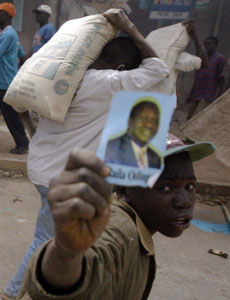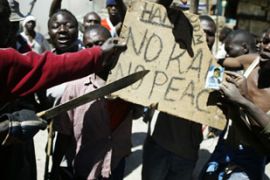Muddying the situation has been a statement by the head of Kenya’s electoral commission that he did not know whether Mwai Kibaki, the incumbent president, had won the vote.
The same official had announced on Sunday that Kibaki narrowly beat out opposition rival Raila Odinga in the poll.
“Kenya is a regional hub and the port of Mombasa serves at least six countries in this region that are landlocked, including Uganda, southern Sudan and Rwanda.
“There are fuel and food shortages there. These are countries that depend on the port of Mombasa for everything that they import.”
Adow said the AU envoy would try to convince both parties to form an all-embracing government of national cohesion, but given the bad blood between Kibaki and Odinga, such an outcome was unlikely.
Appeals for calm
Nevertheless, in a sign of increasing international involvement, Condoleezza Rice, the US secretary of state and David Miliband, the British foreign secretary, issued a joint statement urging Kenya‘s political leaders to call for a halt to the violence.
They were urged to engage in a political and legal process to resolve the crisis and ensure a “united and peaceful future” for Kenya.
On Tuesday, up to 50 children and adults belonging to the Kikuyu ethnic group and sheltering in a church near the western town of Eldoret were burnt alive by an angry mob in one of the worst incidents since the December 27 presidential elections.
Odinga and Kibaki both allege massive vote-rigging in the vote. The violence is the worst Kenya has witnessed since a failed 1982 coup.
With Kibaki belonging to the Kikuyu, Kenya’s largest tribe, and Odinga to the second largest, the Luo, the violence has taken on a distinctly ethnic hue, with tit-for-tat killings and targeted arson attacks.
‘Indescribable’ violence
“What I saw was unimaginable and indescribable,” Abbas Gullet, the director of the Kenyan Red Cross, said after visiting several of the worst hit areas of western Kenya on Tuesday.
“This is a national disaster,”. From the area we visited today there are roughly about 70,000 [displaced].”
Aerial video footage taken by the humanitarian group showed hundreds of houses on fire, farms set ablaze and crude road blocks every 10km, manned by young men with machetes, rocks and bows and arrows.
 |
Hundreds have died in the aftermath
of last week’s elections [AFP] |
Gullet said only those from “the right ethnic group” were allowed through the barricades.
Ugandan officials also reported hundreds of Kikuyu tribes people crossing the border from Kenya.
In Nairobi, slum areas were overrun by rioters burning down shops belonging to members of the Kikuyu tribe and looting anything from refrigerators to basic goods.
Most deaths have come from police firing at protesters, witnesses say, prompting accusations from rights groups and the opposition that Kibaki had made Kenya a “police state”.
Conflicting views
Kibaki has said that all political parties should meet immediately and publicly call for calm, but Odinga told Al Jazeera that he would only talk to Kibaki if the president conceded defeat.
“This is a time for reconciliation, but there must be a basis for that reconciliation,” he said on Tuesday.
“I am ready to talk to Mr Kibaki on condition that he is ready to admit before the people of Kenya that he lost the elections.”
Raphael Tuju, Kenya’s foreign minister, said that there was no reason for Kibaki to resign and problems with the election should be dealt with through the courts rather than through protests.
He said: “Whatever is to be done, whether we are going to have a re-run, that has to be decided in a constitutional way.
“You just don’t decide because one of the parties is aggrieved, because one party complains, or one person complains, ‘OK, you are not happy with the results of the election, let’s have a re-run’.”
Audit urged
EU monitors said the elections had “fallen short” of international standards and urged an independent audit of the results, increasing diplomatic pressure on Kibaki.
 |
Odinga has said he will talk to Kibaki only
if the president concedes defeat [AFP] |
And Samuel Kivuitu, the head of Kenya’s electoral commission, said he was pressured into quickly announcing Kibaki’s election by his ruling party.
He did so despite appeals by EU vote monitors and the state-sponsored human rights commission to delay the announcement until a probe was carried out.
But Michela Wrong, an author and journalist, told Al Jazeera that that the fighting wasn’t simply an ethnic split, but was really about the divisions between rich and poor.
She said: “That’s the ugly surface of a much more profound split [but] there is a sense that this was an elitist government, it was a government that was really only interested in itself, in its own particular group.
“They were doling out jobs to their own people, all the key ministries were in the hands of that group but at the same time were ignoring the needs of the poor.”




